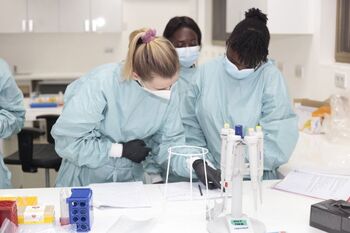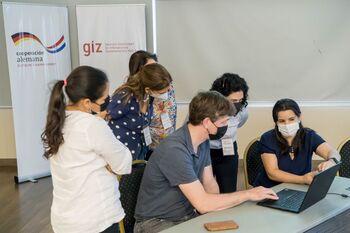German Epidemic Preparedness Team (SEEG): working against epidemics
German Epidemic Preparedness Team (SEEG) as part of the Global Programme for Pandemic Prevention and Response, One Health
-
Client
German Federal Ministry for Economic Cooperation and Development (BMZ) in cooperation with the German Federal Ministry of Health (BMG) and the German Federal Ministry of Food and Agriculture (BMEL)
-
Country
-
Runtime
2015 to 2024
-
Products and expertise
Social development

Context
Dangerous infectious diseases – such as COVID-19, dengue fever, Ebola or bird flu – repeatedly break out all over the world. Preventing and containing such events is a demanding and complex task, especially when the cooperation countries have limited capacities for diagnosis, monitoring and control. The increase in antimicrobial resistance also makes it difficult to reduce bacterial diseases on an international scale.
So that the threats posed by infectious diseases can be quickly identified and contained, it is therefore important to strengthen health systems worldwide and further develop the necessary expertise.
Objective
Cooperation countries are better prepared to detect, diagnose and contain outbreaks of disease across sectors.

Approach
The German Epidemic Preparedness Team (SEEG) includes experts from a cross-functional cooperation network. They support cooperation countries in developing capacities, containing outbreaks, improving laboratories and working together across different sectors. In this context, they pursue the One Health approach, which covers the health of people, animals and the environment.
The core SEEG team at the Deutsche Gesellschaft für Internationale Zusammenarbeit (GIZ) GmbH is incorporated into the Global Programme for Pandemic Prevention and Response, One Health and coordinates the flexible, needs-based composition of the assignment teams. It works together with the Friedrich-Loeffler-Institut, the Robert Koch Institute, the Bernhard Nocht Institute for Tropical Medicine and Charité Universitätsmedizin Berlin.
The SEEG assignment team works in close cooperation with local partners to offer tailored solutions. It also supports cooperation countries in achieving the United Nations Sustainable Development Goals and in developing core capacities to better implement the International Health Regulations. This makes it possible to prevent infections, epidemics and pandemics and promotes health security worldwide.

Last update: July 2023




